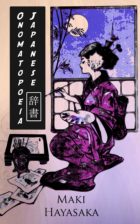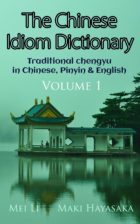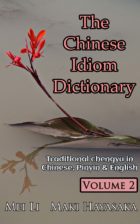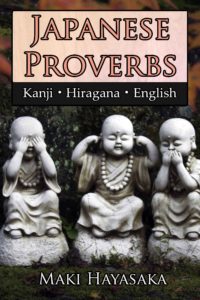Japan is famous for the beauty of its culture and the modest grace of its people. In this collection of nearly 700 traditional Japanese proverbs by Maki Hayasaka, the very best of Japanese wisdom is on display, offering poignant, shrewd, and timeless insights into the human condition. Each proverb is provided in its original language, with hiragana, romaji, and English translations to unpack the wording and interpretations as faithfully as possible.
From love and fate to gender and spirituality, these age-old sayings cover every topic we face in life, with a humble, stoical, and nature-centered wit. For anyone with an interest in Japanese culture, don’t miss out on this window into the cultural thoughts of its people, from ancient times to the present.
1.
笑う門には福来る。
わらうかどにはふくきたる。
Warau kado ni wa fuku kitaru.
Good fortune comes to the homes of those who laugh.
English equivalents: 1) Fortune comes in by a merry gate. 2) Laugh and be fat.
2.
石が流れて木の葉が沈む。
いしがながれてこのはがしずむ。
Ishi ga nagarete ko no ha ga shizumu.
Rocks will flow and leaves will sink.
Meaning: There are exceptions to every rule.
3.
逢うは別れの始め。
あうはわかれのはじめ。
Au wa wakare no hajime.
To meet is the beginning of parting.
Meaning: Life is transient and our time together is temporary.
4.
生酔い本性違わず。
なまよいほんしょうたがわず。
Namayoi honshou tagawazu.
One’s true character is no different when tipsy.
English equivalent: In wine there is truth.
5.
餠は餠屋。
もちはもちや。
Mochi wa mochiya.
For mochi [sticky rice cakes], visit a mochi shop.
Meaning: For the best results, seek out someone who specializes in that particular thing.
English equivalent: Every man knows his own business best.
6.
男心と秋の空。
おとこごころとあきのそら。
Otokogokoro to aki no sora.
A man’s heart and an autumn sky.
English equivalent: A man’s heart is as fickle as an autumn sky.
7.
井蛙は以って海を語る可からず。
せいあはもってうみをかたるべからず。
Seia wa motte umi wo kataru bekarazu.
A frog in a well should not speak [knowingly] about the ocean.
Meaning: A narrow-minded person shouldn’t presume to understand the wider world, because their own view is highly limited.
English equivalent: He that stays in the valley shall never get over the hill.
8. Variation
井の中の蛙大海を知らず。
いのなかのかわずたいかいをしらず。
I no naka no kawazu taikai wo shirazu.
A frog in the well doesn’t know the ocean.
Meaning: People should seek a broader perspective or their understanding will be limited.
English equivalent: He that stays in the valley shall never get over the hill.
9.
青は藍より出でて藍より青し。
あおはあいよりいでてあいよりあおし。
Ao wa ai yori idete ai yori aoshi.
Blue comes from indigo but is bluer than indigo.
Meaning: Blue dye is made from the indigo plant and is ultimately a deeper blue than indigo. Similarly, each generation should surpass the previous one, such as a student surpassing their teacher, or a child surpassing their parents.
English equivalent: The student has become the master.
10.
甘言は偶人を喜ばす。
かんげんはぐうじんをよろこばす。
Kangen wa guujin wo yorokobasu.
Cajolery pleases puppets and dolls.
Meaning: Flattery only pleases a fool.
11.
明けない夜はない。
あけないよるはない。
Akenai yoru wa nai.
No night doesn’t come to an end.
Meaning: Even the darkest moments of our life are temporary, so never lose hope.
English equivalents: 1) This too shall pass. 2) There is always tomorrow.
12.
商いは牛のよだれ。
あきないはうしのよだれ。
Akinai wa ushi no yodare.
Business is [like] a cow’s drool.
Meaning: Business sales should resemble a cow’s drool in stretching out slowly. You shouldn’t try to hurry making a profit.
13.
地震雷火事親父。
じしんかみなりかじおやじ。
Jishin kaminari kaji oyaji.
Earthquakes, lightning, fires, and fathers.
English equivalent: One’s father is more horrifying than any natural disaster.
14.
郷に入っては郷に従え。
ごうにいってはごうにしたがえ。
Gou ni itte wa gou ni shitagae.
When you enter a village, abide by its rules.
English equivalent: When in Rome, do as the Romans do.
15. Variation
郷に入れば郷に従え。
ごうにいればごうにしたがえ。
Gou ni ireba gou ni shitagae.
If you enter a village, abide by its rules.
English equivalent: When in Rome, do as the Romans do.
16.
楽は苦の種、苦は楽の種。
らくはくのたね、くはらくのたね。
Raku wa ku no tane, ku wa raku no tane.
Pleasure is the seed of suffering; suffering is the seed of pleasure.
Meaning: There is no pain without pleasure, and there is no pleasure without pain.
17.
楽あれば苦あり。
らくあればくあり。
Raku areba ku ari.
If there is pleasure, there is pain.
English equivalents: 1) There is no pleasure without pain. 2) Take the good with the bad. 3) There is no rose without a thorn.
18.
三度目の正直。
さんどめのしょうじき。
Sandome no shoujiki.
The integrity of the third time [attempting something].
Meaning: Success often comes after two failures.
English equivalents: 1) The third time’s the charm. 2) Third time lucky.
19.
浮世は夢。
うきよはゆめ。
Ukiyo wa yume.
This fleeting life is a dream.
English equivalents: 1) Life is but a dream. 2) Everything is transient. 3) This too shall pass.
20.
隣の芝生は青い。
となりのしばふはあおい。
Tonari no shibafu wa aoi.
The lawn next door is green.
English equivalent: The grass is always greener on the other side of the fence.
21. Variation
隣の花は赤い。
となりのはなはあかい。
Tonari no hana wa akai.
The flowers next door are red.
English equivalent: The grass is always greener on the other side of the fence.
22. Variation
人の花は赤い。
ひとのはなはあかい。
Hito no hana wa akai.
Other people’s flowers are red.
English equivalent: The grass is always greener on the other side of the fence.
23. Variation
隣の糂粏味噌。
となりのじんだみそ。
Tonari no jinda miso.
The salted rice-bran paste next door [smells sweeter than yours].
English equivalent: The grass is always greener on the other side of the fence.
24.
習うより慣れろ。
ならうよりなれろ。
Narau yori narero.
Familiarity is greater than study.
English equivalents: 1) Experience is the best teacher. 2) Practice makes perfect. 3) You learn best by doing.
25.
赤信号皆で渡れば怖くない。
あかしんごうみんなでわたればこわくない。
Akashingou minna de watareba kowakunai.
If everyone crosses together at a red traffic light, it isn’t scary.
English equivalent: There’s no reason to feel guilty about doing something bad if everyone does it.
26.
女の一念岩をも通す。
おんなのいちねんいわをもとおす。
Onna no ichinen iwa wo mo toosu.
A woman’s will can even overcome a rock.
English equivalents: 1) Women have their wills. 2) Faith can remove mountains.
27.
明鏡も裏を照らさず。
めいきょうもうらをてらさず。
Meikyou mo ura wo terasazu.
Even a clear mirror doesn’t illuminate its reverse side.
Meaning: Even wise people may not be able to see the whole situation correctly.
English equivalent: Even Homer sometimes nods.
28.
据え膳食わぬは男の恥。
すえぜんくわぬはおとこのはじ。
Suezen kuwanu wa otoko no haji.
Rejecting a woman’s advances is a man’s shame.
English equivalents: 1) Shameful is he who spurns a woman’s invitation. 2) Not eating the meal set before him is a man’s shame.
29.
鳴く蝉よりも鳴かぬ蛍が身を焦がす。
なくせみよりもなかぬほたるがみをこがす。
Nakusemi yori mo nakanu hotaru ga mi wo kogasu.
The quiet firefly burns with more passion than the crying cicada.
English equivalent: Empty vessels make the most noise.
30.
無くて七癖、有って四十八癖。
なくてななくせ、あってしじゅうはっくせ。
Nakute nanakuse, atte shi-juu-hakkuse.
Seven habits that aren’t there, and forty-eight habits that are.
English equivalent: Everybody has their faults or quirks.
To boost your studies, check out our collection of Japanese learning material. From traditional grammar to internet slang and ancient proverbs, we have everything you need to learn Japanese effectively.

![Japanese_Proverbs_[LQ]](https://rockwallerbooks.com/wp-content/uploads/2019/10/Japanese_Proverbs_LQ-140x224.jpg)

![Japanese_Slang_[Cover]](https://rockwallerbooks.com/wp-content/uploads/2019/11/Japanese_Slang_Cover-140x224.jpg)

![Total Japanese Grammar [LQ]](https://rockwallerbooks.com/wp-content/uploads/2019/06/Total-Japanese-Grammar-LQ-140x224.jpg)




![Proverbs [LQ]](https://rockwallerbooks.com/wp-content/uploads/2019/09/Proverbs-LQ-140x224.jpg)




Thanks for the translations! Old Japanese is still a bit confusing for me, so this helps quite a bit.
Nice. I wish most dictionaries also gave the older forms of some of the vocab. Would make reading Japanese classics a lot easier.
Same. It can be difficult looking up old Japanese. These proverbs have helped me make sense of some of the language patterns though.
There’s something really beautiful and different about Japanese culture. It’s interesting to see how much of that is part of the language.
I found this when I started learning to read and write Japanese. It embodies such a lot of the living culture and philosophy. Made me appreciate kanji a whole lot more.
I’ve been learning Japanese for about two years now and being able to read the original wording before the translation is a fun way to test myself to see how close I was. Thanks for sharing.
Yeah, I do this too. Gives me another way to study, and it’s super satisfying when I got it right 🙂
Totally – it really helps to keep you motivated. I do a few at the end of each study session, and it feels like a good way to round things off.
Native speakers are always really surprised and impressed when a second-language speaker knows one of their proverbs. It’s nice being able to use one at the right time.
My homestay family in Kyoto were really happy (and surprised) when I knew the “three monkeys” proverb (見ざる聞かざる言わざる).
That’s really cool. How long were you in Kyoto?
For a year. It was going to be six months at first, but I loved it there and organized to stay for the rest of the year (with a different family). It was such a good experience.
I love so many Japanese proverbs, especially some that are unique to Japan and don’t overlap with Western ones. They really show off the culture.
Thanks – I’ve been looking for a full collection of Japanese proverbs for ages! And having the old kanji forms is super helpful.